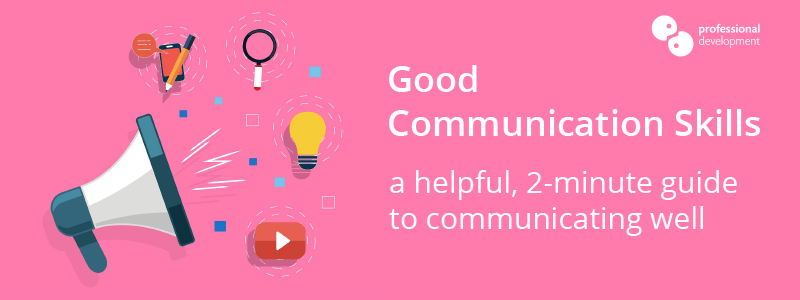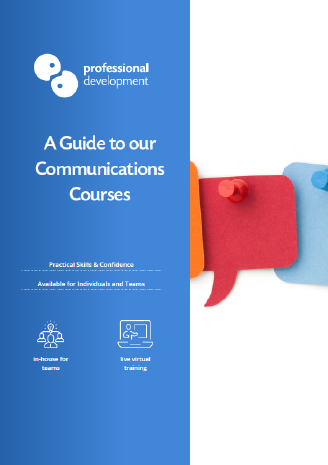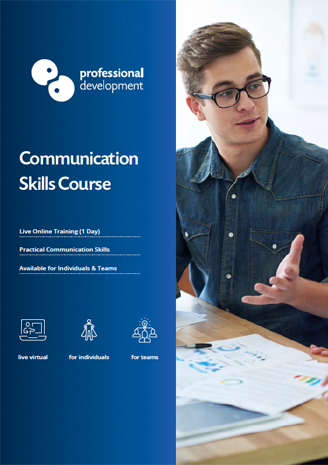Good Communication Skills: Begin Here
Originally published, November 2021Good communication skills: What are they? Why are they important? How can you get them?
In this article, we offer answers to those questions by taking a closer look at the areas listed below.
Jump to Any Section
- What are good communication skills?
- Why are good communication skills important?
- 5 examples of good communication skills
- How can you become a great communicator?
- Spotlight On: Our 1-Day Communication Skills Course
Get Your PDF Guide
Download our PDF Guide to Communication Skills to save the information here and get more material.
Our guide includes a closer look at great communication, gives you an overview of supportive courses, and provides guidance on getting started.
Download GuideWhat are good communication skills?
As we move through the day, we communicate almost constantly through verbal and non-verbal means.
We are natural communicators, but are we good at communicating?
Can we get our message across clearly? Is what we mean easily understood by others? Are we understanding the messages others convey to us?
Good communication is about:
- being aware of the different aspects of interacting with others (speaking, writing, listening, questioning, body language).
- striving to develop your own ability to express yourself clearly, efficiently, and in a positive manner with others.
- listening actively and understanding others.
Why are good communication skills important?
There is no doubt about it, lazy or unclear communication causes problems.
In a work environment, it can create confusion and conflict, cause de-motivation, and lead to lost time, money, and resources.
Often referred to as an optional "soft skill", communication is in fact at the heart of everything that happens in an organisation.
It is crucial to develop a consistent culture of good communication to avoid the pitfalls mentioned above.
How can you take action?
In your role:
Read through the 4 elements listed below to begin developing and strengthening your skills.
Consider attending our 1-day Communication Skills Course to obtain a structured approach to communicating well.
In your organisation:
Look into scheduling a tailored, in-company programme for your team or department.
5 examples of good communication skills
Speaking: Keep It Simple
When you want to get a message across, avoid overcomplicating things.
Take your time and use easy to understand terms to outline what you mean.

Writing: Read It Twice
This applies to emails, memos, letters, and messages you send and receive.
When sending a written note, read it through twice once you have completed it. Do the same for any messages you receive.
Try to consider the other person or people in the conversation. How might they perceive this information? What did they mean in their note?

Listening: Stay Engaged
This is a big one and has its own section on our Communication Skills Course.
It is all too easy to zone out and wait for our turn to speak, but listening is one of the keys to getting the most from an interaction.

Questioning: Focus on Your Goal
Learning how to ask the right questions gets you to the information you need more quickly.
Appropriate questions can also be very useful in helping others to understand.

Body Language: Stay Open
Avoid crossing your arms when speaking to others.
Keeping an open posture expresses that you are confident and trustworthy when you talk.

How can you become a great communicator?
There are 4 elements involved in building a strong toolkit for communicating with others.
Initially, it's a good idea to work through the elements in the order we have listed below.
However, once you have completed each element, you will find that it becomes like a cycle of continuous improvement for your own personal development.

1. Awareness
It is important to become aware of how you are speaking, writing, and reacting throughout your day.
Begin reflecting on conversations, reviewing emails, and taking note of any positive or negative aspects you notice.
You could also observe how you respond to others – what you find easy to understand, how different tones come across, anything that causes a communication barrier.

2. Expanding
It is essential to build on the skills you already have through study and training.
Attending a communication skills course is an excellent way to expand your existing abilities with:
- the advice and guidance of an experienced trainer
- fresh ideas and perspectives from fellow trainees
- the support of tried and proven effective communication techniques
Get Course Brochure View Course

3. Evaluating
Once you have begun to work on expanding your knowledge and abilities, it helps to evaluate your progress.
Similar to the Awareness element, Evaluating is all about keeping track of what’s working and what’s not working in your daily interactions.
At this stage, your new abilities and understanding will prompt you on what to look out for.
It will also provide you with techniques for troubleshooting any barriers that crop up.

4. Developing
You may notice a significant improvement in your interactions with others by now. This is the moment to make a commitment to continuous improvement in this area.
Keep an ongoing cycle of these 4 elements to avoid slipping into bad habits or missing out on new ideas for communicating well.





